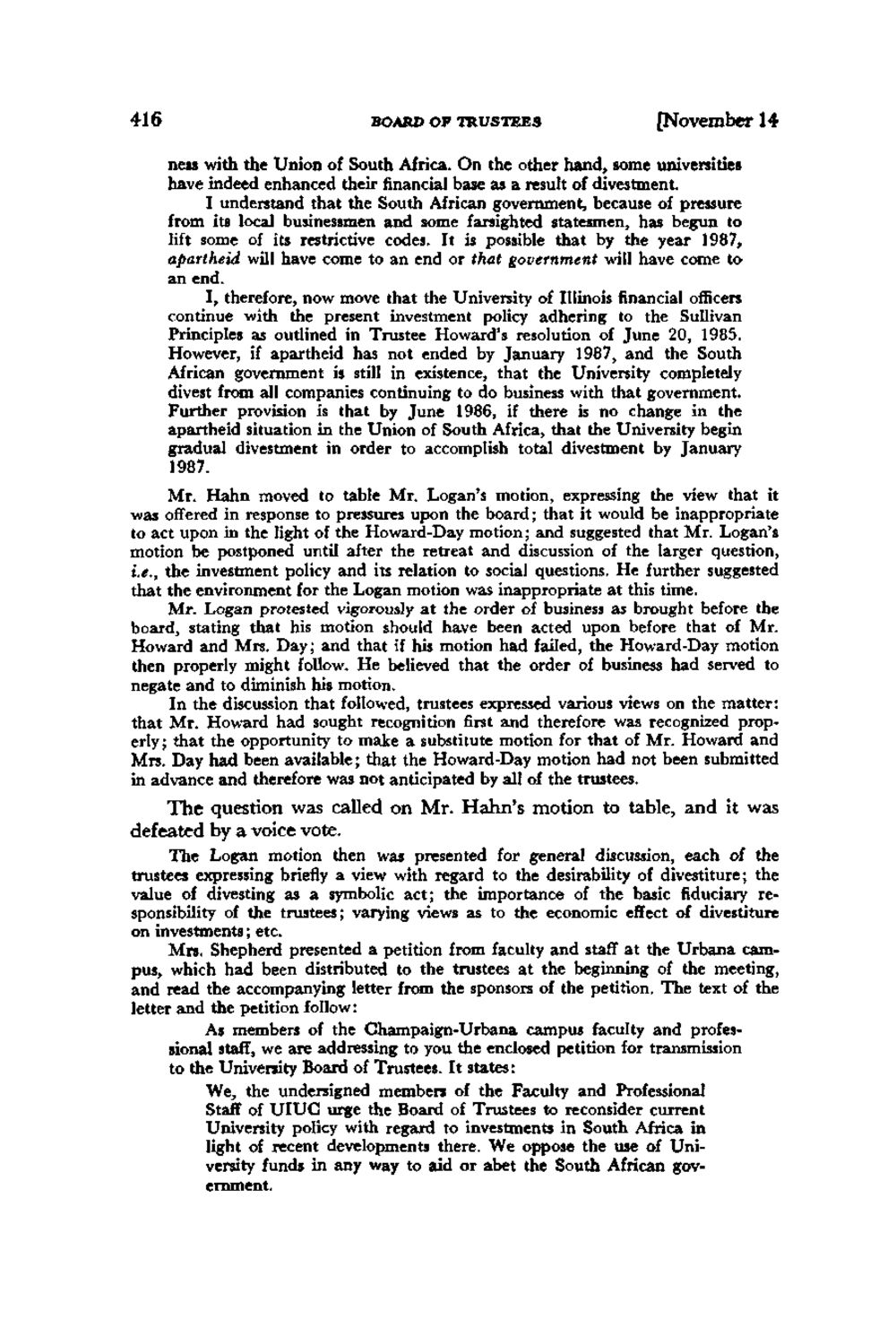| |
| |
Caption: Board of Trustees Minutes - 1986
This is a reduced-resolution page image for fast online browsing.

EXTRACTED TEXT FROM PAGE:
416 BOARD OF TRUSTEES [November 14 ness with the Union of South Africa. On the other hand, some universities have indeed enhanced their financial base as a result of divestment. I understand that the South African government, because of pressure from its local businessmen and some farsighted statesmen, has begun to lift some of its restrictive codes. It is possible that by the year 1987, apartheid will have come to an end or that government will have come to an end. I, therefore, now move that the University of Illinois financial officers continue with the present investment policy adhering to the Sullivan Principles as outlined in Trustee Howard's resolution of June 20, 1985. However, if apartheid has not ended by January 1987, and the South African government is still in existence, that the University completely divest from all companies continuing to do business with that government. Further provision is that by June 1986, if there is no change in the apartheid situation in the Union of South Africa, that the University begin gradual divestment in order to accomplish total divestment by January 1987. Mr. H a h n moved to table Mr. Logan's motion, expressing the view that it was offered in response to pressures upon the board; that it would be inappropriate to act upon in the light of the Howard-Day motion; and suggested that Mr. Logan's motion be postponed until after the retreat and discussion of the larger question, i.e., the investment policy and its relation to social questions. He further suggested that the environment for the Logan motion was inappropriate at this time. Mr. Logan protested vigorously a t the order of business as brought before the board, stating that his motion should have been acted upon before that of Mr. Howard and Mrs. D a y ; and that if his motion had failed, the Howard-Day motion then properly might follow. He believed that the order of business had served to negate and to diminish his motion. In the discussion that followed, trustees expressed various views on the matter: that M r . Howard had sought recognition first and therefore was recognized properly; that the opportunity to make a substitute motion for that of Mr. Howard and Mrs. Day had been available; that the Howard-Day motion had not been submitted in advance and therefore was not anticipated by all of the trustees. T h e q u e s t i o n w a s c a l l e d o n M r . H a h n ' s m o t i o n t o t a b l e , a n d it w a s defeated by a voice vote. The Logan motion then was presented for general discussion, each of the trustees expressing briefly a view with regard to the desirability of divestiture; the value of divesting as a symbolic act; the importance of the basic fiduciary responsibility of the trustees; varying views as to the economic effect of divestiture on investments; etc. Mrs. Shepherd presented a petition from faculty and staff at the Urbana campus, which had been distributed to the trustees at the beginning of the meeting, and read the accompanying letter from the sponsors of the petition. The text of the letter and the petition follow: As members of the Champaign-Urbana campus faculty and professional staff, we are addressing to you the enclosed petition for transmission to the University Board of Trustees. It states: We, the undersigned members of the Faculty and Professional Staff of U I U C urge the Board of Trustees to reconsider current University policy with regard to investments in South Africa in light of recent developments there. We oppose the use of University funds in any way to aid or abet the South African government.
| |